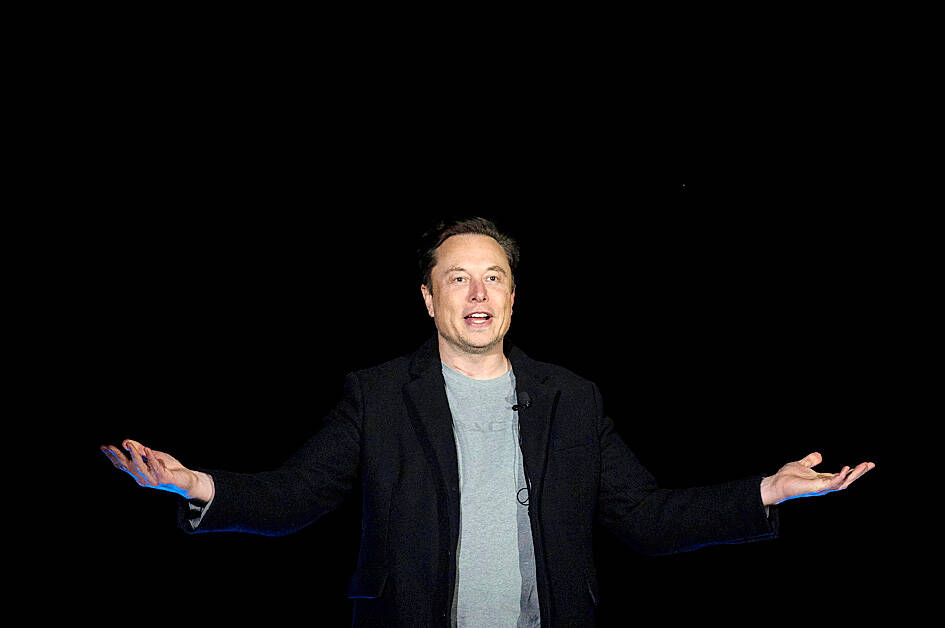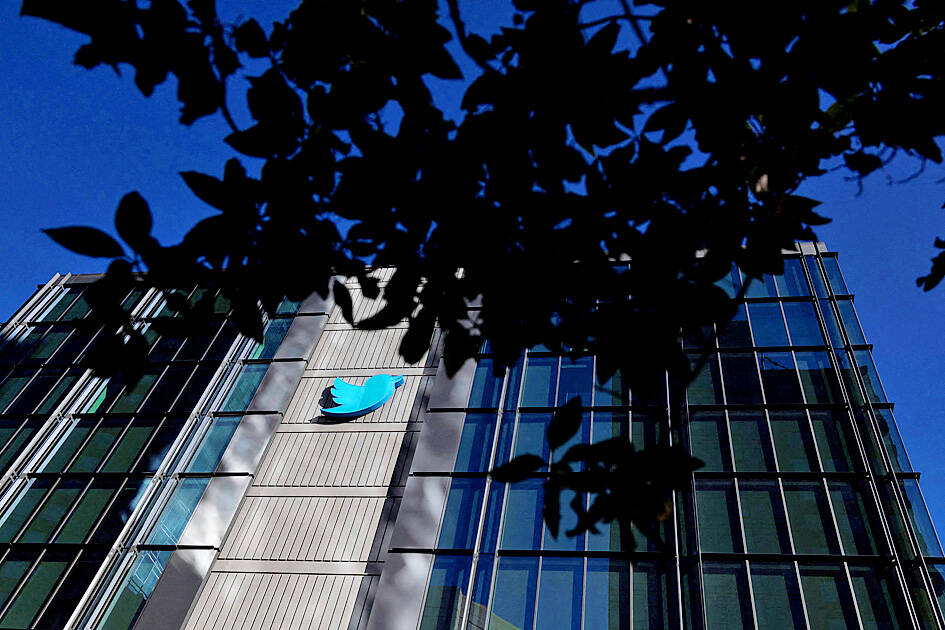Twitter Inc has made deeper cuts into its already radically diminished trust and safety team handling global content moderation, as well as to the unit related to hate speech and harassment, people familiar with the matter said.
At least a dozen more cuts on Friday night affected workers in the company’s Dublin and Singapore offices, the sources said, adding that they include Twitter revenue policy senior director Analuisa Dominguez and Nur Azhar Bin Ayob, the company’s head of site integrity for the Asia-Pacific region, a relatively recent hire.
Workers on teams handling the social network’s misinformation policy, global appeals and state media on the platform were also eliminated, the sources said.

Photo: AFP
Ella Irwin, Twitter’s head of trust and safety, confirmed that several members of the teams were cut, but denied that they targeted some of those areas.
“It made more sense to consolidate teams under one leader [instead of two] for example,” Irwin said in an e-mailed response to a request for comment.
She said Twitter eliminated roles in areas of the company that did not get enough “volume” to justify continued support.

Photo: Reuters
However, she said that Twitter had since Elon Musk bought the company in October last year increased staffing in its appeals department, and that it would continue to have a head of revenue policy and a head for the platform’s Asia-Pacific region for trust and safety.
Musk bought Twitter for US$44 billion, partly financing the deal with almost US$13 billion of debt that entailed interest repayments of about US$1.5 billion a year. Since taking over the company, Musk has overseen firings or departures of about 5,000 of Twitter’s 7,500 employees and instituted a “hardcore” work environment for those remaining.
Twitter faces multiple lawsuits over unpaid bills, including for private chartered plane flights, software services and rent at one of its San Francisco offices.
Musk has urged a US federal judge to shift a trial in a shareholder lawsuit out of San Francisco, saying negative local media coverage has biased potential jurors against him.
In a filing submitted late on Friday — less than two weeks before the trial was set to begin — Musk’s lawyers said it should be moved to the federal court in the Western District of Texas. That district includes the state capital, Austin, which is where Musk relocated his electric vehicle company, Tesla Inc, in late 2021.
The shareholder lawsuit stems from Twitter posts by Musk in August 2018, when he said he had sufficient financing to take Tesla private at US$420 a share — an announcement that caused heavy volatility in Tesla’s share price.
In a victory for the shareholders early last year, US District Judge Edward Chen (鄭一芳) ruled that Musk’s tweets were false and reckless.
If moving the trial is not possible, Musk’s lawyers want it postponed until negative publicity regarding the billionaire’s purchase of Twitter has died down.
However, the shareholders’ attorneys emphasized the last-minute timing of the request, saying that “Musk’s concerns are unfounded and his motion is meritless.”
The filing by Musk’s attorneys also said that Twitter has laid off about 1,000 residents in the San Francisco area since he purchased the company.
Musk has also been criticized by San Francisco’s mayor and other local officials for the job cuts, the filing said.

The Eurovision Song Contest has seen a surge in punter interest at the bookmakers, becoming a major betting event, experts said ahead of last night’s giant glamfest in Basel. “Eurovision has quietly become one of the biggest betting events of the year,” said Tomi Huttunen, senior manager of the Online Computer Finland (OCS) betting and casino platform. Betting sites have long been used to gauge which way voters might be leaning ahead of the world’s biggest televised live music event. However, bookmakers highlight a huge increase in engagement in recent years — and this year in particular. “We’ve already passed 2023’s total activity and

Nvidia Corp CEO Jensen Huang (黃仁勳) today announced that his company has selected "Beitou Shilin" in Taipei for its new Taiwan office, called Nvidia Constellation, putting an end to months of speculation. Industry sources have said that the tech giant has been eyeing the Beitou Shilin Science Park as the site of its new overseas headquarters, and speculated that the new headquarters would be built on two plots of land designated as "T17" and "T18," which span 3.89 hectares in the park. "I think it's time for us to reveal one of the largest products we've ever built," Huang said near the

China yesterday announced anti-dumping duties as high as 74.9 percent on imports of polyoxymethylene (POM) copolymers, a type of engineering plastic, from Taiwan, the US, the EU and Japan. The Chinese Ministry of Commerce’s findings conclude a probe launched in May last year, shortly after the US sharply increased tariffs on Chinese electric vehicles, computer chips and other imports. POM copolymers can partially replace metals such as copper and zinc, and have various applications, including in auto parts, electronics and medical equipment, the Chinese ministry has said. In January, it said initial investigations had determined that dumping was taking place, and implemented preliminary

Intel Corp yesterday reinforced its determination to strengthen its partnerships with Taiwan’s ecosystem partners including original-electronic-manufacturing (OEM) companies such as Hon Hai Precision Industry Co (鴻海精密) and chipmaker United Microelectronics Corp (UMC, 聯電). “Tonight marks a new beginning. We renew our new partnership with Taiwan ecosystem,” Intel new chief executive officer Tan Lip-bu (陳立武) said at a dinner with representatives from the company’s local partners, celebrating the 40th anniversary of the US chip giant’s presence in Taiwan. Tan took the reins at Intel six weeks ago aiming to reform the chipmaker and revive its past glory. This is the first time Tan